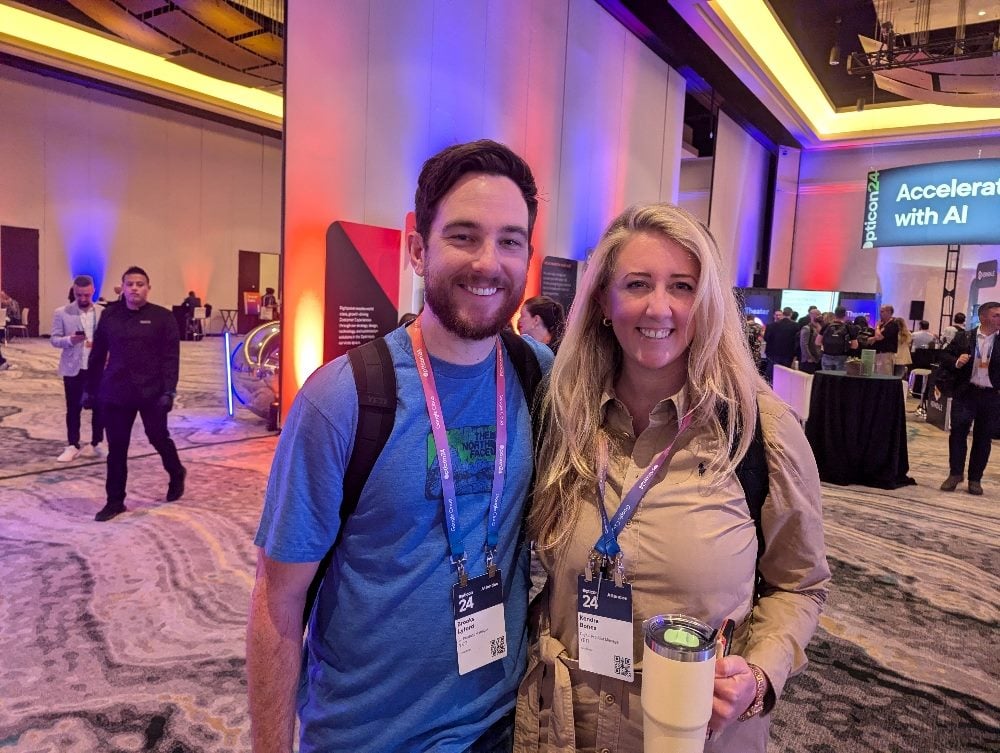The Gist
- AI adoption shapes strategies. Practitioners share stories of experimentation, cautious adoption and deep investments in artificial intelligence.
- Ethics and governance matter. Companies are prioritizing ethical guidelines and data safety in their AI implementations.
- AI drives creativity and efficiency. From content creation to SEO and ecommerce, AI could redefine processes while amplifying human contributions — but it's not quite there yet.
SAN ANTONIO — The cautionary tale of artificial intelligence implementations continued here in the Land of the Alamo at Optimizely’s Opticon in San Antonio.
Marketing and digital experience leaders shared stories of experimentation, governance and the challenges of scaling AI in regulated environments. Their stories reflect a balance between innovation and pragmatism, reflecting the growing role of AI — albeit turtle pace kinda growth — in shaping the digital experience landscape.
It dovetails our collection of thoughts from leaders at earlier digital experience conferences this year — Adobe, Sitecore and Acquia.
From Panic to Productivity: AI’s Impact on Marketing Teams
For Izabela Misiorny, CMO at Siteimprove, the introduction of AI tools like ChatGPT brought initial panic to marketing teams.
“Everyone panicked a little bit. It’s like, OK, what is happening? This is definitely disrupting marketing,” Misiorny said. However, the focus quickly shifted to how AI could enhance creativity and streamline workflows.
“Don’t just sit back and let ChatGPT create the content. Show me where you add value as a marketer — with your creativity, with your humanity,” she said. Her team uses AI tools like Claude and Gemini to generate initial drafts, but human marketers refine the content to ensure quality and relevance.
Despite this progress, challenges remain. Misiorny emphasized the importance of developing formal AI usage policies and addressing the growing complexity of tools like Google Analytics 4 (GA4). She highlighted the importance of simplifying content and the potential of AI in data analysis, noting the benefits of immediate data access for marketing teams.

Related Article: Winning With AI in Marketing: Strategic Moves for CMOs
Building an Ethical Framework for AI
At Ingredion, the cautious integration of AI underscores their commitment to ethical practices.
“We want to engage with AI in a way that is ethical and sustainable,” said Idania Borrero-Knight, global digital marketing planning manager. The company’s digital council, composed of IT and marketing leaders, ensures AI adoption aligns with organizational values.
“We won’t use AI-generated images for anything customer-facing,” Borrero-Knight explained. The council has also prioritized guidelines that define acceptable use cases for AI tools, aiming to prevent unauthorized use of creative outputs and secure sensitive data.
This careful approach extends to how the team supports its growth. Marketing has grown, and her role is to provide scaffolding and processes for the team to succeed. Ultimately for Ingredion, AI is a means to enhance — not replace — human creativity and collaboration.

Overcoming Data Silos in Ecommerce
For YETI’s ecommerce team, the biggest barrier to AI adoption is data integration.
“Our data is spread over so many different services,” said Brooks Lyford, senior product manager. Consolidating this data into a unified platform is essential for leveraging AI effectively, but it remains a complex challenge.
Kendra Bones, digital product manager at YETI, highlighted shifting consumer expectations.
“I do think consumers will start to expect new kinds of digital experiences that are more AI-powered because basic actions like searching on Google have now changed,” she said.
This demands a careful balance between innovation and trust, especially for a luxury brand like YETI. “If customers get spooked by AI, it’s doing more harm than good,” Lyford added. "I'm not saying I'm against it by any means. I'm saying that's an obstacle you have to get over."
Beyond integration, the team is exploring how AI impacts SEO and search. “True organic search results... it's going to be very different,” Lyford said. Bones emphasized the need for clean data to ensure AI models accurately interpret user intent.

Related Article: Reimagining Ecommerce With AI: Fast Transactions, Fun Interactions
Redefining Success Through AI
Across these organizations, the message is clear: AI is not just a tool but a transformative enabler — maybe. Leaders are focusing on creating frameworks that ensure AI complements human efforts, whether through content creation, governance or consumer engagement.
As Misiorny summarized: AI is a way to amplify what we do, but it needs our humanity to make it truly impactful.
Borrero-Knight added a forward-looking perspective that is rooted in constantly getting value for the business and customers: “We don't want to put our creative outputs out there... all without any value returning."
